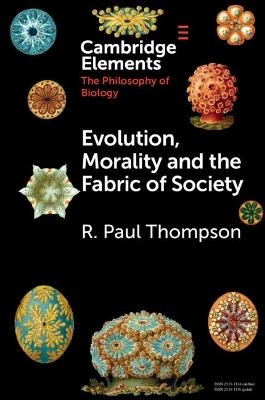
Evolution, Morality and the Fabric of Society
Seiten
2022
Cambridge University Press (Verlag)
978-1-108-74170-5 (ISBN)
Cambridge University Press (Verlag)
978-1-108-74170-5 (ISBN)
Derives and justifies moral principles, naturalistically, from evolved human behavioural propensities (reciprocity, cooperation, empathy) and cognitive capacities (rationality, behavioural modification).
Recent interest in the evolution of the social contract is extended by providing a throughly naturalistic, evolutionary account of the biological underpinnings of a social contract theory of morality. This social contract theory of morality (contractevolism) provides an evolutionary justification of the primacy of a moral principle of maximisation of the opportunities for evolutionary reproductive success (ERS), where maximising opportunities does not entail an obligation on individuals to choose to maximise their ERS. From that primary principle, the moral principles of inclusion, individual sovereignty (liberty) and equality can be derived. The implications of these principles, within contractevolism, are explored through an examination of patriarchy, individual sovereignty and copulatory choices, and overpopulation and extinction. Contractevolism is grounded in evolutionary dynamics that resulted in humans and human societies. The most important behavioural consequences of evolution to contractevolism are reciprocity, cooperation, empathy, and the most important cognitive consequences are reason and behavioural modification.
Recent interest in the evolution of the social contract is extended by providing a throughly naturalistic, evolutionary account of the biological underpinnings of a social contract theory of morality. This social contract theory of morality (contractevolism) provides an evolutionary justification of the primacy of a moral principle of maximisation of the opportunities for evolutionary reproductive success (ERS), where maximising opportunities does not entail an obligation on individuals to choose to maximise their ERS. From that primary principle, the moral principles of inclusion, individual sovereignty (liberty) and equality can be derived. The implications of these principles, within contractevolism, are explored through an examination of patriarchy, individual sovereignty and copulatory choices, and overpopulation and extinction. Contractevolism is grounded in evolutionary dynamics that resulted in humans and human societies. The most important behavioural consequences of evolution to contractevolism are reciprocity, cooperation, empathy, and the most important cognitive consequences are reason and behavioural modification.
1. Prologetic Remarks; 2. Social Contract Theory; 3. Evolution of Social Behaviour and Sociality; 4. Contractevolism: An Evolution-based Moral Theory; 5. Hume's Barrier and Moore's Fallacy; 6. Contractevolism and Patriarchy; 7. Individual Sovereignty and Copulatory Choices; 8. Contractevolism and Overpopulation; References.
| Erscheinungsdatum | 23.05.2022 |
|---|---|
| Reihe/Serie | Elements in the Philosophy of Biology |
| Zusatzinfo | Worked examples or Exercises |
| Verlagsort | Cambridge |
| Sprache | englisch |
| Maße | 152 x 229 mm |
| Gewicht | 131 g |
| Themenwelt | Naturwissenschaften ► Biologie ► Evolution |
| Sozialwissenschaften ► Ethnologie | |
| Sozialwissenschaften ► Soziologie | |
| ISBN-10 | 1-108-74170-3 / 1108741703 |
| ISBN-13 | 978-1-108-74170-5 / 9781108741705 |
| Zustand | Neuware |
| Haben Sie eine Frage zum Produkt? |
Mehr entdecken
aus dem Bereich
aus dem Bereich
Wie die Vernichtung der Arten unser Überleben bedroht - Der …
Buch | Softcover (2023)
Penguin (Verlag)
CHF 20,95


